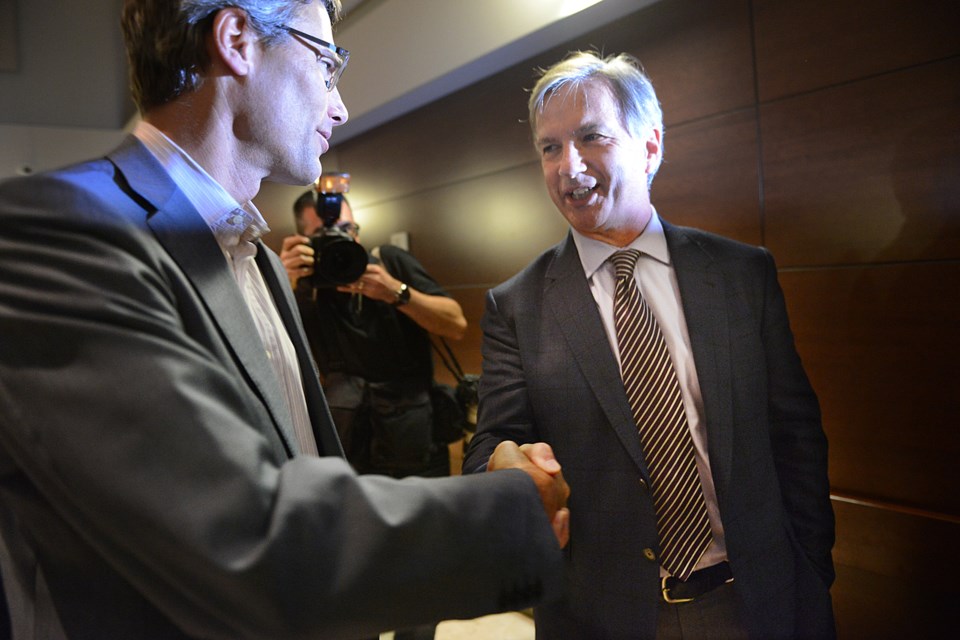An energetic new organization of faith groups, labour unions and community advocates came together in the hundreds Thursday night to hear which four mainstream civic parties would best represent its views on affordable housing, transit, poverty and social isolation.
In what so far has been a lacklustre election campaign, the Metro Vancouver Alliance gave the civic race a lively boost by attracting more than 600 of its delegates to the Italian Cultural Centre.
Representatives of the alliance outlined key needs on the four topics before challenging Mayor Gregor Robertson, NPA mayoral candidate Kirk LaPointe, COPE mayoral candidate Meena Wong and Green Party Coun. Adriane Carr to make commitments to their proposals.
All of the candidates, who sat in chairs on a stage at the front of a cavernous hall, agreed to work with the alliance on solutions to combat social isolation, improve transit and develop a so-called living wage. They also committed to enforce bylaws to ensure decent standards of maintenance in rental suites, protect tenants from "renovictions" and set covenants for new developments that creates "truly affordable housing" for renters and buyers.
The evening marked the first time Robertson and LaPointe shared a stage together in the campaign but the format of the event did not allow for exchanges between candidates.
That, however, didn't stop either party leader from criticizing each other's views on the issues, with Robertson questioning LaPointe's stance on the mayor's push for a subway along the Broadway corridor.
"I must say I've been disappointed to not see a wholehearted, optimistic support from Mr. LaPointe and his party," Robertson said.
LaPointe didn't respond but he has said previously that Robertson's campaign for a subway is but "an aspiration posing as a done deal," with no commitments from senior levels of government to build a $1 billion underground transit service.
LaPointe did tell the crowd he supports the provincial government's transit referendum scheduled for next spring but opposes Robertson's wish to redirect the existing carbon tax to help pay for transit improvements in the region.
"Under the law, the carbon tax must be revenue neutral and the biggest beneficiary of that revenue are lower income British Columbians," he said. "So we're penalizing lower income to take that revenue away."
The crowd was arguably Vision-friendly territory, with a wide range of unions in the hall, many of which have traditionally supported the party financially and at the polls. Bus drivers, teachers and health care workers were among the delegates. Most, if not all, of the Vision candidates campaigning towards the Nov. 15 election were present.
This observation didn't seem to be lost on LaPointe, who used his opening remarks on the issue of social isolation to share his story of an impoverished childhood in Toronto.
"I am not the NPA leader that you might think you know," he said, retelling a story he first told reporters during his campaign launch in July. "I grew up in poverty. I'm the product of a single mother who was hero and had to decide whether to keep me or keep my older brother. She sent my older brother away to live with friends. So I understand isolation."
Wong, who has received national media attention for her call to tax absentee homeowners, received the biggest applause of the four candidates when they were introduced to the crowd.
But Wong struggled with the one-minute response times allotted to candidates, often being cut off by the moderator while reading prepared notes.
What she did get across to the crowd was that aboriginal people and immigrants need a bigger voice in civic decisions. Also, she said COPE would put a transit pass in "everyone's hands" by increasing taxes to corporations and lobby for a $15 an hour minimum wage, making it first effective for hotel workers and chain stores.
Carr kept to her party's central campaign theme that people are being shut out of decisions at city hall and, she said, that has to change to develop better civic policies, particularly around social isolation.
"Number one, we have to put people in charge of the neighbourhoods and the places they live," said Carr, who was the only one of the four candidates not running for mayor but seeking a council seat. The alliance agreed to invite candidates whose parties held a seat on council over the last two terms.
She referred to the Whistler Housing Authority model when asked about affordable housing, saying a levy should be imposed on large new commercial developments to help pay for the construction or purchase of affordable housing.
The evening ended with Joey Hartman, president of the Vancouver and District Labour Council, thanking the candidates for their commitments to work with the alliance to create affordable housing, improve transit services and decrease social isolation and poverty.
But, Hartman added, "we're not so naive as to think there's not going to be some work to do and hashing out details."
The alliance is comprised of 14 labour organizations, including the Hospital Employees' Union, 16 community groups including the Aboriginal Life in Vancouver Enhancement Society and more than 20 faith groups representing various religions. The alliance identified social isolation, or loneliness, as its top priority to be addressed.
A Vancouver Foundation survey conducted in 2012 with 3,841 residents in Metro Vancouver revealed that the region can be a hard place to make friends, that neighbourhood connections are "cordial but weak" and that many residents are retreating from community life.


